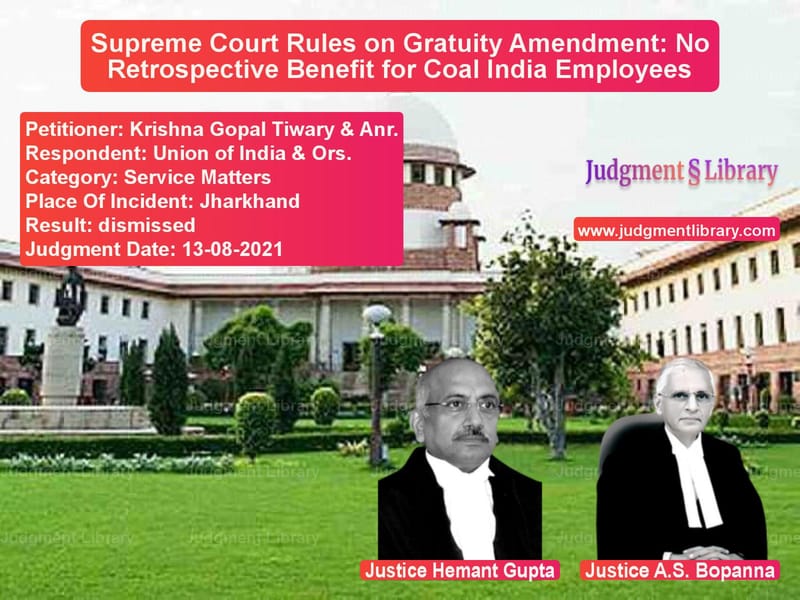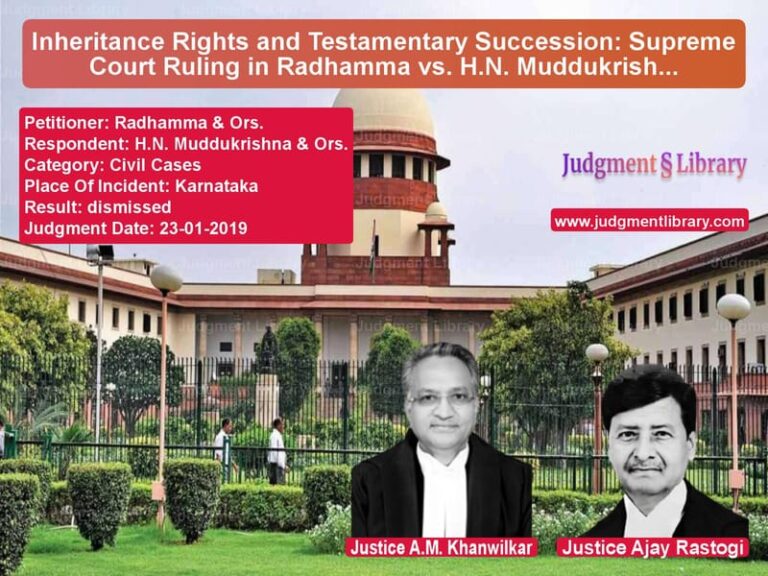Supreme Court Rules on Gratuity Amendment: No Retrospective Benefit for Coal India Employees
The case of Krishna Gopal Tiwary & Anr. vs. Union of India & Ors. revolved around the dispute over the applicability of the Payment of Gratuity (Amendment) Act, 2010, to employees of Coal India Limited. The Supreme Court was tasked with determining whether the amended gratuity ceiling of Rs. 10 lakh should be applied retrospectively from January 1, 2007, or from the date notified by the government, which was May 24, 2010.
Case Background
The appellants, employees of Coal India Limited, challenged the decision of the Jharkhand High Court, which had ruled that the Payment of Gratuity (Amendment) Act, 2010, could not be applied retrospectively from January 1, 2007. The employees contended that they should be entitled to the enhanced gratuity amount of Rs. 10 lakh from 2007, the date when the benefit was granted through an office memorandum by the Government of India.
The amendment to the Payment of Gratuity Act, 1972, was enacted through Central Act No. 15 of 2010, which received presidential assent on May 17, 2010. The amendment increased the ceiling of gratuity from Rs. 3.5 lakh to Rs. 10 lakh. The government issued a notification on May 24, 2010, setting this as the effective date for the amendment.
Arguments by the Petitioners (Coal India Employees)
- The appellants contended that the amendment should be made applicable from January 1, 2007, since the government had already approved enhanced gratuity for public sector enterprises from that date.
- “The Payment of Gratuity Act is a beneficial piece of legislation, and the amendment should be interpreted liberally to extend its benefits retrospectively,” argued the petitioners.
- The petitioners relied on the Supreme Court’s judgment in D.S. Nakara & Ors. v. Union of India, where it was held that arbitrary cut-off dates in pension cases violated Article 14 of the Constitution.
- Tax was deducted at source on the gratuity received before the amendment, and retrospective application would allow them to claim refunds.
Arguments by the Respondents (Union of India)
- The Union of India opposed retrospective application, arguing that the amendment was brought into effect from May 24, 2010, as per the government’s discretion.
- “The government has the right to determine the effective date of legislative amendments, and the decision to apply it prospectively was based on financial and administrative considerations,” contended the government.
- Unlike pension, which is a recurring benefit, gratuity is a one-time payment, and therefore, it does not warrant retrospective application.
- Retrospective application would impose an unforeseen financial burden on public sector enterprises and the government.
Supreme Court’s Observations
The Supreme Court examined three key issues:
1. Can the Payment of Gratuity (Amendment) Act, 2010, be applied retrospectively?
- The Court ruled that the amendment was not intended to be retrospective.
- “Retrospectivity is not presumed unless explicitly stated in the statute. The amendment specified that it would come into force from a date to be notified by the government,” the judgment noted.
2. Is there a violation of Article 14 due to different treatment of employees retiring before and after May 24, 2010?
- The Court held that such classification was reasonable and not arbitrary.
- “Legislative amendments often fix cut-off dates based on financial and administrative considerations, which do not violate the right to equality,” the judgment stated.
3. Can the principle in D.S. Nakara be applied to gratuity cases?
- The Court distinguished pension from gratuity, stating that pension is a continuous benefit while gratuity is a one-time payment.
- “The principle in D.S. Nakara applies primarily to pension cases and does not extend to one-time statutory payments like gratuity,” the Court clarified.
Supreme Court’s Judgment
The Supreme Court ruled:
- “The Jharkhand High Court’s decision is upheld, and the Payment of Gratuity (Amendment) Act, 2010, is applicable prospectively from May 24, 2010.”
- “The appellants are not entitled to claim enhanced gratuity benefits from January 1, 2007.”
- “Tax deductions on gratuity payments made before May 24, 2010, are lawful and cannot be refunded.”
Conclusion
The Supreme Court’s ruling reinforces the principle that financial legislation is generally prospective unless explicitly stated otherwise. By upholding the government’s discretion in fixing the effective date of amendments, the judgment ensures fiscal stability while clarifying that retrospective claims cannot be made unless expressly provided in the law.
Petitioner Name: Krishna Gopal Tiwary & Anr..Respondent Name: Union of India & Ors..Judgment By: Justice Hemant Gupta, Justice A.S. Bopanna.Place Of Incident: Jharkhand.Judgment Date: 13-08-2021.
Don’t miss out on the full details! Download the complete judgment in PDF format below and gain valuable insights instantly!
Download Judgment: krishna-gopal-tiwary-vs-union-of-india-&-ors-supreme-court-of-india-judgment-dated-13-08-2021.pdf
Directly Download Judgment: Directly download this Judgment
See all petitions in Pension and Gratuity
See all petitions in Public Sector Employees
See all petitions in Employment Disputes
See all petitions in Judgment by Hemant Gupta
See all petitions in Judgment by A. S. Bopanna
See all petitions in dismissed
See all petitions in supreme court of India judgments August 2021
See all petitions in 2021 judgments
See all posts in Service Matters Category
See all allowed petitions in Service Matters Category
See all Dismissed petitions in Service Matters Category
See all partially allowed petitions in Service Matters Category







